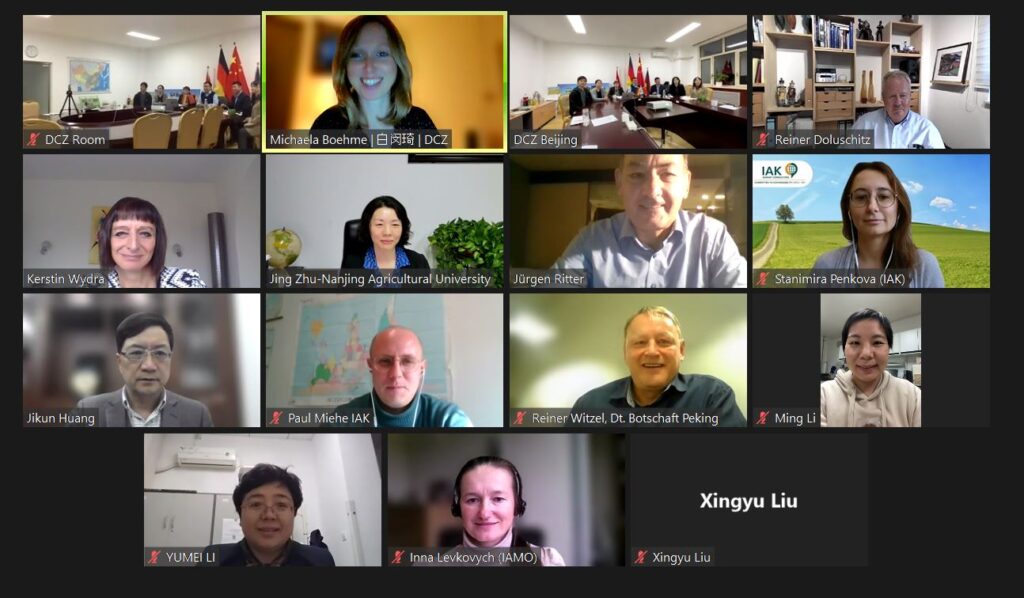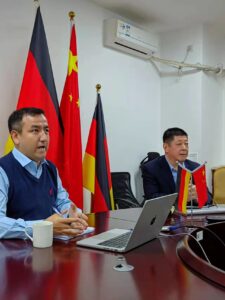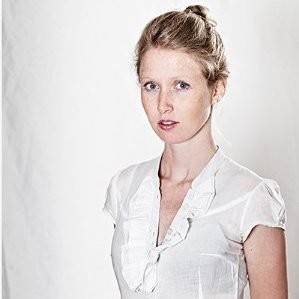On 21 October, the Sino-German Agricultural Centre (DCZ) held a roundtable event to discuss the current and future food security challenges facing China, Germany, and the global community. Held as a hybrid event, the roundtable brought together renowned scholars from both countries to discuss the overall food security situation in Germany/ the EU and China in the face of the new challenges arising from war in Ukraine, the ongoing Covid-19 pandemic, and climate change.
Roundtable speakers from China included Prof. Jikun HUANG, Director of the New Rural Development Institute and Honorary Director of the China Center for Agricultural Policy at Peking University as well as Prof. Jing ZHU, professor at the College of Economics and Administration, Nanjing Agricultural University. Prof. Reiner DOLUSCHITZ, agricultural economist and former Director of the Food Security Center FSC at University of Hohenheim, and Prof. Kerstin WYDRA, Chair for Plant Production and Climate Change at the Erfurt University of Applied Sciences and Member of the UN Committee on World Food Security, joined the roundtable discussion on the German side.
Following the opening remarks by DCZ Managing Directors Dr. Jürgen RITTER und Mr. Geng WANG, each of the four invited experts gave a short statement analyzing the issue of food security from a different thematic and theoretical perspective. The statements were followed by an animated panel discussion, moderated by DCZ expert Dr. Aihemaitijiang (Ahmatjan) ROUZI.
With respect to the current situation, the debate highlighted that food security has been a long-standing priority for the Chinese government. Strong support for domestic agricultural production has seen remarkable increases in agricultural yields and output, making China largely self-sufficient in the production of staple grains and other basic food products. In Germany and the EU, the agricultural sector, despite the war in Ukraine, has long been able to produce enough food for local populations but rising prices have made access to food more difficult for low-income groups. The roundtable also pointed to multiple challenges from climate change to the loss of biodiversity that risk to threaten future agricultural production.
To tackle these challenges, Prof. Huang pointed to the potential benefits of digital technologies on food production, while Prof. Zhu stressed the need for more collaboration and fair rules in international trade governance. China would work to strengthen the role of the World Trade Organization (WTO) in stabilizing agricultural trade and volatility in agricultural markets, she emphasized. For Prof. Doluschitz, food security policies should focus more strongly on sustainability and be closely aligned with the UN’s Sustainable Development Goals (SDG). Focusing on the linkages between food, energy, and water, Prof. Wydra advocated new agricultural models such as agrivoltaics that would allow to combine the production of renewable energy and food while saving water resources, thereby making agriculture more resilient to climate change. Tackling food insecurity would also need to involve rethinking current land use patterns, Prof. Wydra argued, as only 22% of Germany’s farmland are used for food production, while 60% are used to produce feed.
On the global scale, stable agriculture markets and international collaboration were highlighted as important means for achieving food security. While the role of new technologies and farm-size upscaling were stressed by the panelists, Prof. Wydra drew attention to the fact that small-scale farmers, particularly in the Global South, produce the lion’s share of the world’s food needs and should receive more policy support. Food security policies should protect smallholders from “land grabbing” by international agri-businesses and encourage farmers in the Global South to produce locally adapted staples foods rather than switching to the high-input production models dominant in the Global North, Prof. Wydra argued.
The event was attended by representatives from the German embassy in Beijing, the China Academy of Agricultural Sciences (CAAS), China Agricultural University. DCZ’s key partners the Foreign Economic Cooperation Centre (FECC) of the Chinese Ministry of Agriculture and Rural Affairs, IAK Agrar Consulting, and the Leibniz Institute of Agricultural Development in Transition Economies (IAMO) also joined the event.






